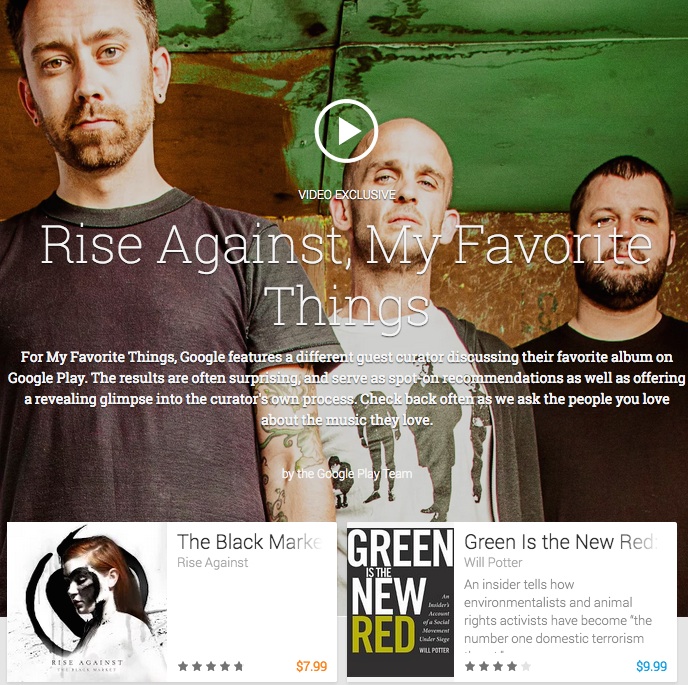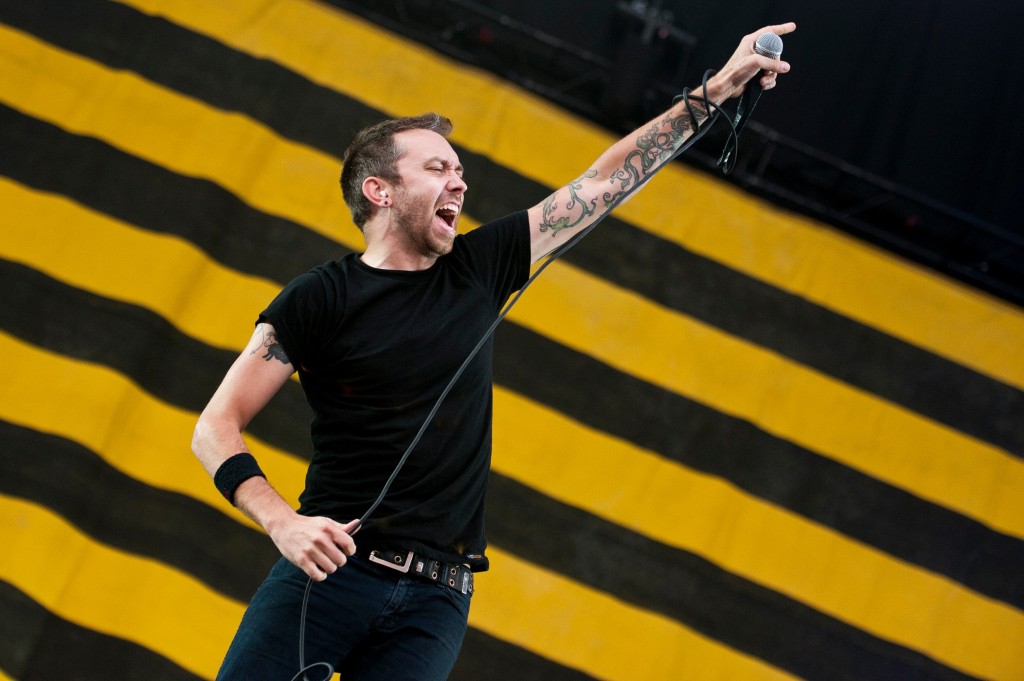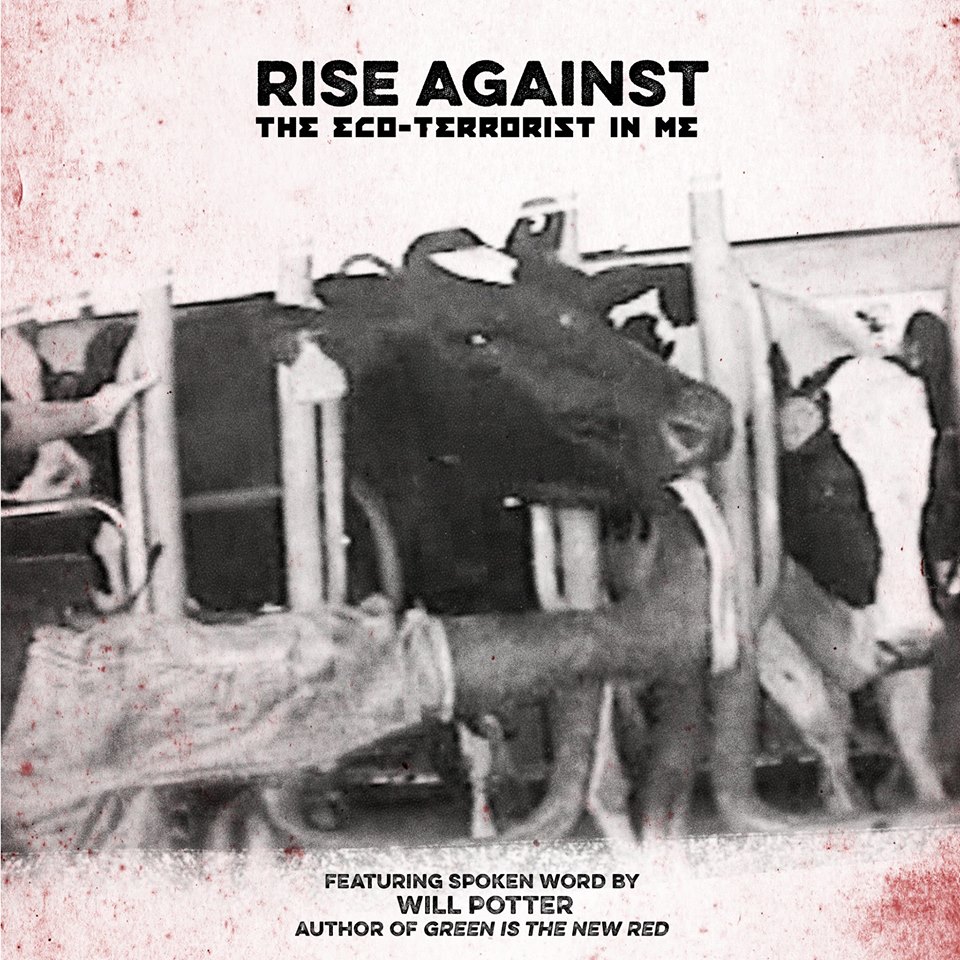Rise Against is releasing a limited edition 7″ for Record Store Day, with a spoken word track by me, and a song that they say was inspired by Green Is the New Red. So I sat down with Tim McIlrath to talk about the new song, Rise Against’s activism, and why he still has hope.
1) Rise Against has a long history of advocating for both animal and human rights. Could you start off by telling us about how you, personally, got involved in social justice issues?
I didn’t grow up in a particularly political or even a very musical family, so finding both was sort of my own journey. Like a lot of people who find punk or hardcore, I didn’t connect with a lot of popular culture. I attribute the underdog and every-man mentality of this scene as my gateway drug to social justice issues. A lot of punk and hardcore music had meaning and substance that I couldn’t find in much of commercial music. The first time I heard the word ‘sweatshop’ was at a hardcore show. Concepts like environmentalism or gentrification were introduced to me through the lense of music. I owe a lot to the tight-knit scenes around Chicago in the 90s that brought me up.
2) Your new album, “The Black Market,” feels darker than your other releases, both personally and politically. It feels like there’s this constant tension between being completely overwhelmed and exasperated with what’s going on in the world, and trying to push forward. What was the writing process like for this album?
I guess a lot of this record comes an activist ‘burnout’ perspective; that inevitable phenomenon that anyone who pushes for change experiences at some point. Hitting that wall can result in surrender, or it can be a rallying point. This is our 7th record, and I didn’t want to just be regurgitating something we’ve already talked about. That’s sort of the concept behind ’The Black Market’. We traffic in a place that can be dark and full of angst and sadness, but we do it for the right reasons and we all need that reminder. I feel like the best way of dealing with that is taking it head on instead of ignoring it. Getting burned out can be a place where you regroup and take stock of where you started and where you are going. A lot people in the Rise Against community are on this journey. When I talk to our fanbase they have similar questions.
3) One of your new songs exposes an issue many people aren’t aware of: how people who fight for the environment and animals are being labeled as “terrorists.” What inspired you to write “The Eco-Terrorrist In Me?”
Your book! Specifically, the ag-gag and animal enterprise acts that are being passed to protect big factory farms while criminalizing the investigators who would blow the whistle on them. Every few years, I have the pleasure of reading a book that not only touches on an issue that not enough people are talking about, but nails it. Green Is The New Red nailed it. I’d been hearing rumblings of the laws that big agriculture were putting in place via well-funded lobbies and well-funded candidates, but reading Green Is The New Red really hit home and helped me fully understand what was happening. I thought referencing the Red Scare was particularly effective, as it points to a historical precedent and infers that we can learn from mistakes. The establishment invented this loaded term ‘eco-terrorist’ to play into America’s fears, and I wanted the song title to take the term back and claim it for anyone who relates to someone who put it all on the line to protect our future.
4) The line “Instead of doing what’s right, they build higher walls” reminded me of ag-gag laws that make it illegal to photograph animal cruelty on factory farms. Rise Against has used footage of animal cruelty like this years ago in the video for “Ready to Fall,” and for a lot of fans I think that was the first time they had seen anything like that. Why do you think similar images are being criminalized?
Images depicting animal suffering are being criminalized for a pretty simple reason; they are powerful and compelling. I’m a big believer in the fact that the animal industry relies on a lack of transparency to keep operating the way it does. Not everyone is moved by slaughterhouse footage, but a lot of people are. “Ready To Fall†was our homage to the footage that changed our lives, and also our way of sort of hijacking mainstream music culture to get this stuff out to the people we knew would be checking the video out. It had an even bigger impact than we anticipated. Made possible by the brave animal rights activists who put their lives on the line to procure the footage, our video was a collaboration with both PETA and their ‘Meat Is Murder’ film as well as Earthlings by Shaun Monson.
 5) Rise Against has a massive social media presence (with more fans on Facebook than the Washington Post), and an activism section on your website. Can you talk about the potential of using these online tools?
5) Rise Against has a massive social media presence (with more fans on Facebook than the Washington Post), and an activism section on your website. Can you talk about the potential of using these online tools?
The reach of online tools is something we are still learning about everyday to be honest. We’re a band that has been treading lightly in the world of social media since its inception. Without ignoring what a powerful medium it is becoming, we try to maintain a tasteful and healthy relationship with our ‘online presence’ while remembering that the music and the message is at the heart of what we do. That said, this is the way the world is currently talking to each other and we want to be a part of the conversation. So without tweeting what we had for breakfast, we are in touch with our community of fans with not only band-related stuff like touring, but also with issues we feel could be illuminated.
6) Music has played a central role in social justice struggles, and punk and hardcore in particular have been vital to the development of the grassroots animal rights and environmental movements. Do you think of your own writing process in this way, or is it more personal?
When I look back at the lyrics I’ve written for our songs, I feel like they have a foot both in the personal and the political. As people, we are all complex and complicated and not just one thing. One moment, human rights is something you feel strongly, but tomorrow your girlfriend breaks up with you. I’d like to think our songs reflect those intricacies of the human condition.
7) I keep thinking about the chorus of “Eco-Terrorist In Me”: “When it all comes down will you say you did everything you could?” It feels like the days we are living in are full of both staggering hopelessness and unprecedented opportunity. I know this is a sweeping question, but what do you think are our prospects for change? What can people reading this do?
I feel like the unique perspective I can share from my vantage point is that there is hope. What I mean by that, is this: I put words down and sing songs about what’s happening in the world, and instead of these words falling without a sound down a deep dark hole, people hear them. Those same people are rallied by them and gravitate towards them. We condemn things like animal suffering and celebrate things like gay rights and talk about fairness and accountability and I get to stand on a stage every night and see the next generation singing them back to me. Not everyone gets it, but enough people do. We aren’t the biggest band in the world, but we are part of the fabric and the friction that creates real change. Each show we play, it’s a continually inspiring process and a cure-all for jadedness. Each person can be part of that push in their own way no matter how small.

